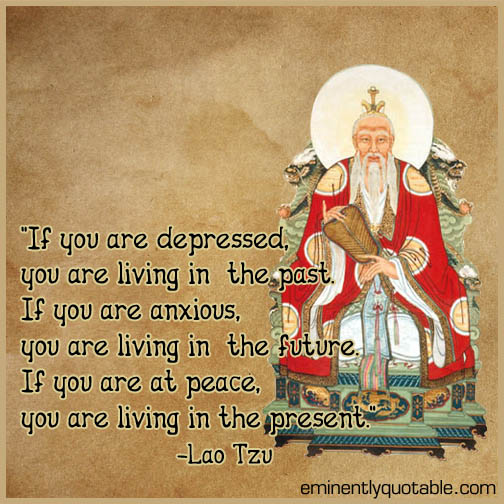
graphic © eminentlyquotable.com | photo – Wikipedia
“If you depressed, you are living in the past. If you are anxious, you are living in the future. If you are at peace, you are living in the present.” – Lao Tzu
Lao Tzu was a Chinese philosopher and poet believed to have existed from 604 BC – 531 BC. The famous book “Tao Te Ching” and the subsequent founding of Taoism are attributed to him. Little has been ascertained about his life. Lao Tzu or Laozi is not a name but an honorific title that means “Venerable Master”
Lao Tzu is considered as the spiritual equivalent of Buddha in Taoism and the “Tao Te Ching” is so highly regarded that it might be regarded as their equivalent of the Bible. This ancient religion became widely known through the spread of martial arts, Feng Shui, and Tai Chi. It is pantheistic in nature but it doesn’t recognize any omnipotent or eternal god. The pursuit of spiritual immortality, among other things, is the objective in following “The Tao” or “The Way.” To this date, it is estimated to have about twenty million followers around the world.
As implied in the quote above, “The Tao” is about living each day with complete attentiveness and a desire for peace. Taoists believe that attaining harmony and union with the universe is one of the main purposes in life. Much like Buddhism, meditation and mindfulness are necessary practices to living a life of “Tao.” Their similarities are due to the fact that Taoism and Buddhism both emphasize Zen or the concept of “now” in attaining spiritual growth.
Alan Watts, British-born philosopher known for popularizing eastern philosophy in the west, described—rather humorously—the concept of zen: “Zen does not confuse spirituality with thinking about God while one is peeling potatoes. Zen spirituality is just to peel the potatoes.”
😳 What Tinnitus Does To Your Brain Cells (And How To Stop It)
After 47 years of studies and countless brain scans done on more than 2,400 tinnitus patients, scientists at the MIT Institute found that in a shocking 96% of cases, tinnitus was actually shrinking their brain cells.
As it turns out, tinnitus and brain health are strongly linked.
Even more interesting: The reason why top army officials are not deaf after decades of hearing machine guns, bombs going off and helicopter noises…
Is because they are using something called "the wire method", a simple protocol inspired by a classified surgery on deaf people from the 1950s...
★ How To Get Rid Of Nail Fungus:
★ Does Your Salad Contain This Vegetable?
★ Top 10 Most Valuable Medicinal Herbs:





